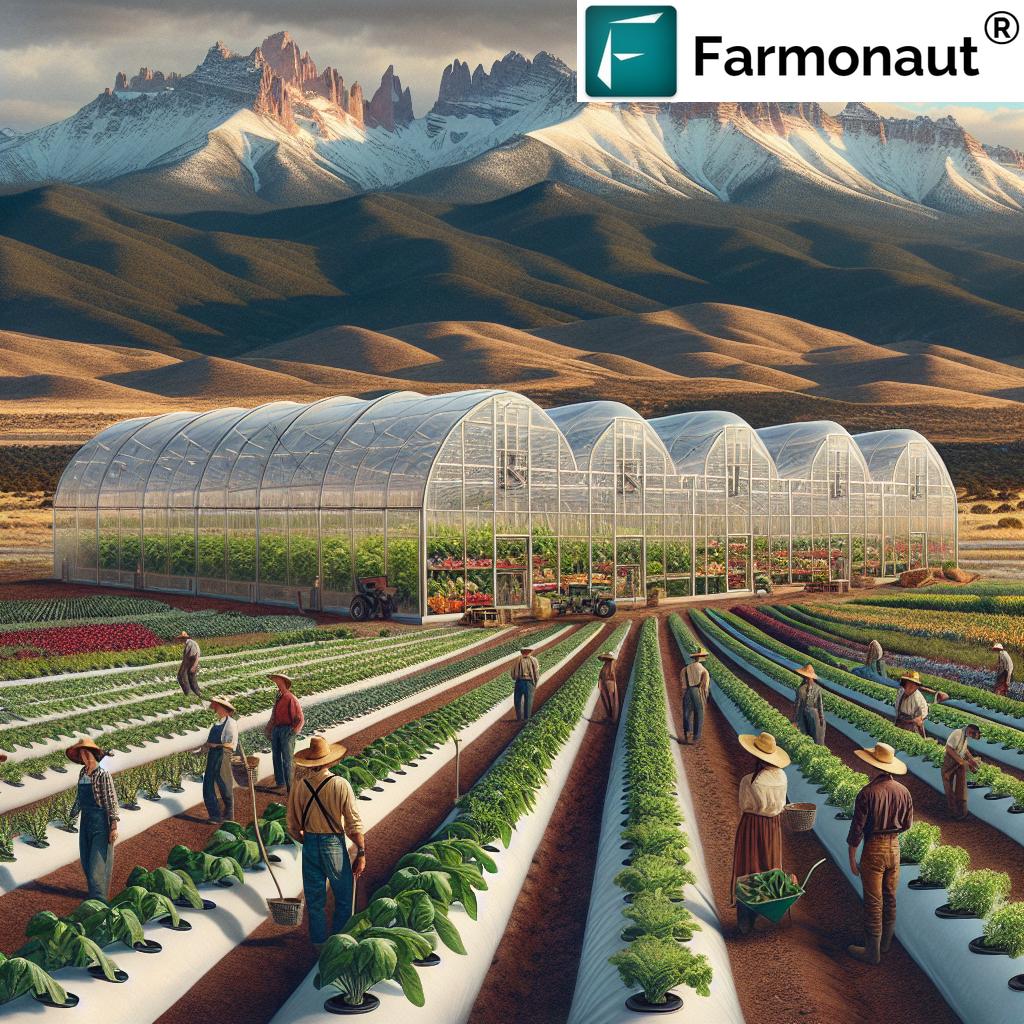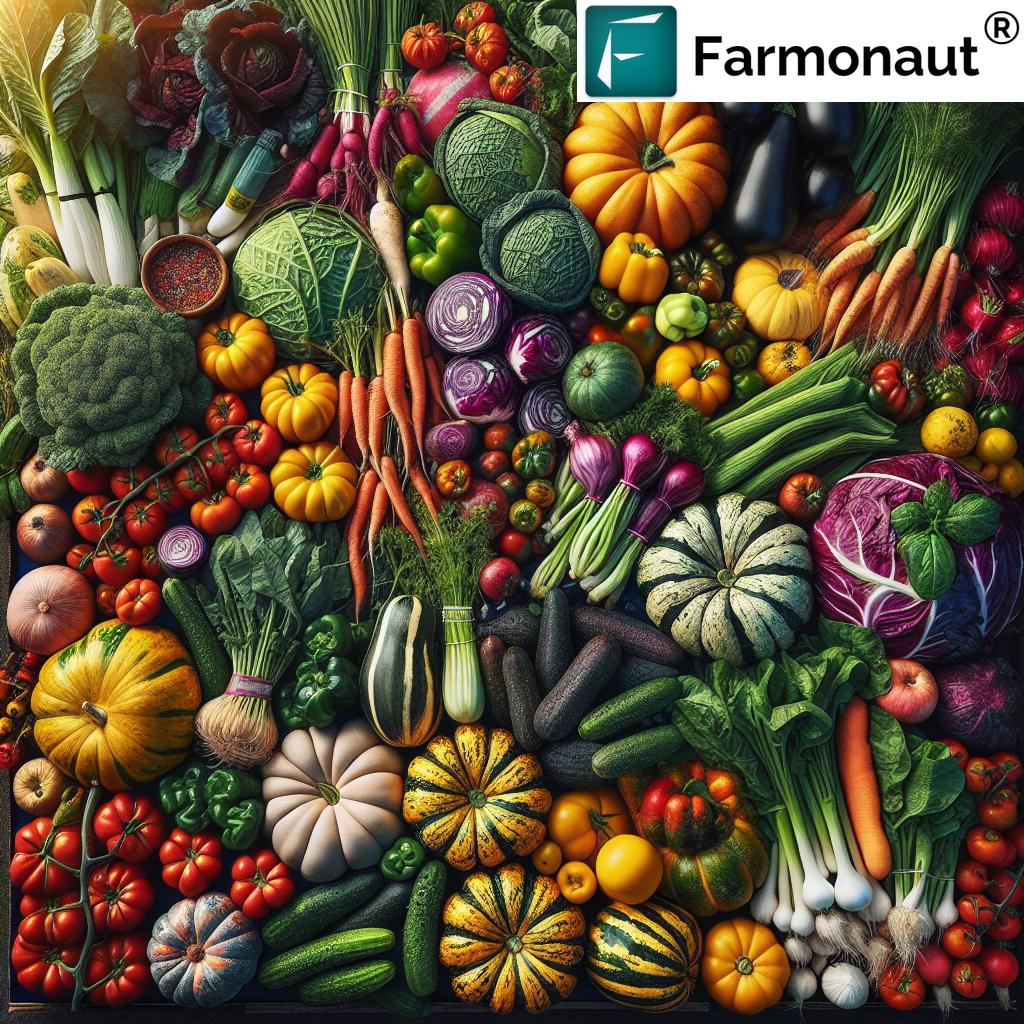Revolutionizing Española Valley: How Innovative Farmers Conquer Climate Challenges for Year-Round Organic Harvests
In the heart of Northern New Mexico, Española Valley farmers are pioneering a new era of sustainable farming practices that are transforming the local food economy and setting new standards for organic vegetable production. These innovative agriculturists are not just adapting to the harsh realities of New Mexico farming challenges; they’re conquering them with ingenuity and determination.

The Santa Fe Farmers Market All-Stars: Champions of Sustainable Agriculture
The Santa Fe Farmers Market recently celebrated its 2024 Farmer All-Stars, recognizing three exceptional farms that epitomize the spirit of innovation and sustainability in the region:
- Khalsa Family Farms
- The Vagabond Farmers
- Cañada Farms
These farms are at the forefront of sustainable farming in Española Valley, each contributing uniquely to the vibrant tapestry of the local food economy in Northern New Mexico.
Khalsa Family Farms: Pioneers of Year-Round Organic Vegetable Production
Jim Fischer, a seasoned farmer with 40 years of experience in Wisconsin, now oversees an impressive 22,000 square feet of indoor vegetable production at Khalsa Family Farms. This nonprofit organization has become a beacon of innovative climate-controlled agriculture in the Española Valley.
Fischer’s expertise shines through in his ability to “read plants,” a skill honed over decades of hands-on farming. This intuitive understanding of plant health is crucial in maintaining the farm’s commitment to organic methods and year-round production.
Greenhouse Farming Techniques: The Future of Agriculture
Khalsa Farms has embraced year-round greenhouse farming as a solution to the region’s unpredictable climate. Their state-of-the-art 8,600 square foot greenhouse, complete with an underground “climate battery,” exemplifies the farm’s dedication to climate-controlled agriculture.
This innovative system, coupled with three additional grow tunnels, allows Khalsa Farms to produce an astounding 35 vegetable products throughout the year, from delicate edible flowers to hearty slicing tomatoes.

For farmers looking to implement similar greenhouse farming techniques, tools like the Farmonaut app can provide valuable insights into crop health and environmental conditions.
The Vagabond Farmers: Embracing Seasonal Challenges
Osiris Nasnan of The Vagabond Farmers represents a new generation of agriculturists who are finding innovative ways to thrive despite limited resources. Farming on just two rented acres in the La Puebla area, Nasnan demonstrates that sustainable farming is possible even on a small scale.
Acequia Irrigation: Preserving Tradition in Modern Agriculture
One of the most significant New Mexico farming challenges and solutions is water management. The Vagabond Farmers rely on traditional acequia irrigation systems, showcasing how ancient techniques can be integrated into modern sustainable farming practices.
“Water is kind of the seasonal hardship,” Nasnan explains. “Either there’s too much of it with crazy monsoons or hail, or too little, with a drought.”
To address these water management challenges, farmers can utilize the Farmonaut Satellite Weather API, which provides crucial data for irrigation planning and weather prediction.
Cañada Farms: Cultivating Community and Food Security
Joel González, owner of Cañada Farms, embodies the spirit of community-focused farming. With 5 acres of land north of Española, González not only contributes to the local food economy but also promotes food security by offering vegetables at half price to elderly community members.
Soil Health and Seasonal Extension: Keys to Abundant Harvests
Cañada Farms is recognized for its commitment to soil health improvement and the use of greenhouses for seasonal extension. These practices allow for increased productivity and a more stable food supply, addressing critical food security concerns in the region.
González’s dedication to agriculture spans two decades, highlighting the importance of experience and perseverance in overcoming New Mexico farming challenges.
The Impact of Sustainable Farming on the Local Food Economy
The efforts of these innovative farmers extend far beyond their fields. They are integral to the thriving local food economy in Northern New Mexico, with the Santa Fe Farmers Market serving as a crucial hub for connecting producers with consumers.
- Direct sales to local restaurants
- Community engagement through farmers markets
- Creation of value-added products to minimize waste
These strategies not only support the farmers but also strengthen the entire local food system, promoting sustainability and resilience.
Overcoming Climate Challenges with Technology
As climate change continues to present new challenges, farmers in the Española Valley are turning to technology to adapt and thrive. Tools like the Farmonaut app provide crucial support for modern agricultural practices:
For developers interested in integrating agricultural data into their own applications, the Farmonaut API Developer Docs provide comprehensive guidance.
Conclusion: A Sustainable Future for Española Valley Agriculture
The innovative farmers of the Española Valley are not just producing food; they’re cultivating a sustainable future for their community. Through a combination of traditional wisdom, modern technology, and unwavering dedication, they are overcoming the unique challenges of farming in New Mexico.
As these agricultural pioneers continue to push the boundaries of what’s possible in organic vegetable production and climate-controlled agriculture, they pave the way for a more resilient and sustainable food system. Their success serves as an inspiration and a model for farmers across the region and beyond, demonstrating that with innovation and perseverance, it’s possible to achieve year-round harvests even in the face of climate adversity.
As we look to the future of agriculture in the Española Valley and beyond, it’s clear that the combination of traditional farming wisdom and cutting-edge technology will be key to ensuring food security and sustainability for generations to come.


